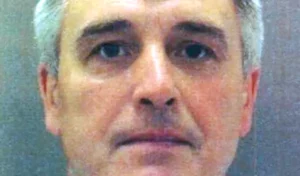Third Russian spy charged over Salisbury Novichok poisonings

A third Russian spy faces charges of attempted murder over the Salisbury Novichok poisonings in March 2018, the Metropolitan Police said.
The man was named as Denis Sergeev, but also used the alias Sergey Fedotov. He faces a string of charges including trying to kill former Russian spy Sergei Skripal, his daughter Yulia and ex-police officer Nick Bailey.
The Skripals were left fighting for their lives in March 2018 when members of a Russian military intelligence squad are believed to have smeared the deadly chemical weapon on Skripal’s door handle in Salisbury, Wiltshire.
Bailey was one of the officers investigating the case and also became
seriously ill.
Sergeev is accused of seven charges, including three of attempted murder as well as conspiracy to murder Sergei Skripal, causing grievous bodily harm with intent to Yulia Skripal and Nick Bailey, and possession and use of a chemical weapon.
These are the same counts faced by two other suspects in the case already identified by police in 2018 – Alexander Mishkin, who used the name Alexander Petrov while in Britain, and Anatoliy Chepiga, who used the alias Ruslan Boshirov.
Investigators say they now have evidence linking the three to Russian military intelligence service the GRU, and that the trio have been involved in similar operations in other countries including Bulgaria and the Czech Republic.
News website Bellingcat previously reported that Sergeev is suspected of involvement in the poisoning of an arms manufacturer, his son and a factory manager in Bulgaria in 2015, while Chepiga and Mishkin are accused of being part of a squad behind an explosion at an arms depot in the Czech Republic the previous year.
On Tuesday Deputy Assistant Commissioner Dean Haydon, who is the senior national co-ordinator for UK counter-terrorism policing, said: “The investigation team has been piecing together evidence that suggests that Petrov, Boshirov and Fedotov have all previously worked with each other and on behalf of the Russian state as part of operations carried out outside of Russia.”
They had all visited Britain before 2018, although there is no evidence that this was for reconnaissance purposes, police said.
“All three of them are dangerous individuals,” Haydon said. “They have tried to murder people here in the UK, and they have also brought an extremely dangerous chemical weapon into the UK by means unknown.
“The amount of Novichok in that perfume bottle was quite significant and if it had come into the wider circulation of the public, without a doubt it would have killed hundreds if not thousands of people.”
Sergeev entered Britain at 11 am on March 2 2018, flying from Moscow to Heathrow and arriving about four hours before Mishkin and Chepiga landed at Gatwick.
The three met a number of times in the coming days, both out in the open and at indoor venues, but Sergeev did not leave the capital.
No traces of Novichok were found in the hotel room that he stayed in for two nights, before flying back to Moscow from Heathrow at lunchtime on March 4.
The poison was contained in a counterfeit perfume bottle, tragically found in June that year in a charity shop bin in Amesbury by Charlie Rowley.
He was left seriously ill and his girlfriend Dawn Sturgess died after coming into contact with the deadly substance.
Source: GNA
